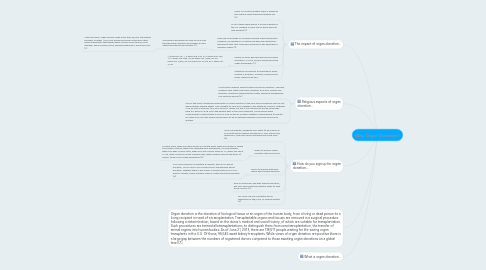
1. Organ donation is the donation of biological tissue or an organ of the human body, from a living or dead person to a living recipient in need of a transplantation. Transplantable organs and tissues are removed in a surgical procedure following a determination, based on the donor's medical and social history, of which are suitable for transplantation. Such procedures are termed allotransplantations, to distinguish them from xenotransplantation, the transfer of animal organs into human bodies. As of June 21, 2013, there are 118,617 people waiting for life-saving organ transplants in the U.S. Of these, 96,645 await kidney transplants. While views of organ donation are positive there is a large gap between the numbers of registered donors compared to those awaiting organ donations on a global level (7).
2. What is organ donation...
3. The impact of organ donation...
3.1. Every 10 minutes another name is added to the national organ transplant waiting list (2).
3.2. In 2010 there were almost 2.5 million deaths in the US. Imagine if every one of those persons had donated (1).
3.3. Each day an average of 79 people receive organ transplants. However, an average of 21 people die each day waiting for transplants that cant' take place because of the shortage of donated organs (1).
3.3.1. One person donating can save up to 8 lives through organ donation and enhance many others through tissue donation (1).
3.3.1.1. Last year alone, organ donors made more than 28,000 transplants possible. Another 1,000,000 people received cornea and other tissue transplants that helped them recover from trauma, bone damage, spinal injuries, burns, hearing impairment, and vision loss (1).
3.4. People of every age give and receive organ donations. In 2013, 28,954 people received organ transplants: (1)
3.4.1. <1 year old: 241, 1-5 years old: 437, 6-10 years old: 230, 11-17 years old: 589, 18-34 years old: 1,983, 35-49 years old: 4,699, 50-64 years old: 10,516, 65+ years old: 4,272
3.5. Statistics are difficult to understand. Every number is a person, a human, someone you know, maybe even you...
4. Religious aspects of organ donation...
4.1. Most major religions support organ and tissue donation. Typically, religions view organ and tissue donation as acts of charity and goodwill. Questions regarding this matter would be answered by you spiritual advisor (4).
4.2. One of the most compelling arguments for organ donation is the love and compassion such an act demonstrates toward others. The mandate to "love your neighbor" was stated by Jesus in Matthew 5:43, by Paul in Romans 13:9, and James in James 2:8, but it can actually be traced all the way back to Leviticus 19:18. From the earliest days in the Old Testament, God's people were commanded to demonstrate a love for God as well as for their neighbors. Being willing to donate an organ from our own bodies would seem to be an extreme example of selfless sacrifice for another.
5. How do you sign up for organ donation...
5.1. Most importantly, designate you intent to be a donor in your state donor registry and the DMV. Also notify your physician's, and your family members and loved ones (3).
5.2. When to discuss organ donation with you family:
5.2.1. A family meal, when you leave home as a young adult, when you obtain or renew your driver's license, when you celebrate your anniversary, on your birthday, when you hear a donor story, when you see a donor story on TV, when you see a TV ad, after a friend or family member dies, when children discuss the topic at school, today since it was brought up (5).
5.3. Topics to discuss with your family about organ donation:
5.3.1. Your OWN reasons for wanting to donate, the FACTS about donation, MYTHS and MISCONCEPTIONS people have about donation, whether there is any organ or tissue that you DO NOT want to donate, family member view on organ and tissue donation (5).
